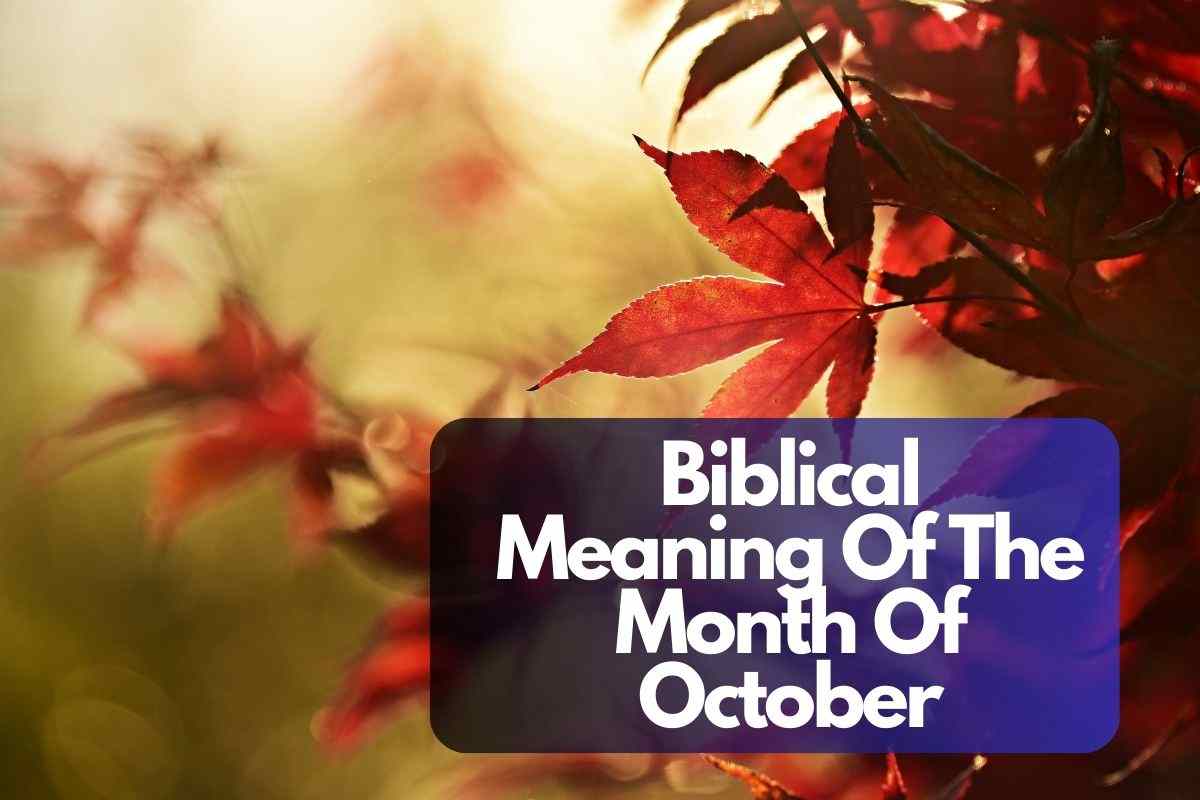In the biblical calendar, the month of October corresponds to the seventh month, Tishrei, according to the Hebrew calendar. It is a month that holds great importance in Jewish tradition, characterized by significant festivals and observances. These include the Feast of Trumpets (Rosh Hashanah), the Day of Atonement (Yom Kippur), and the Feast of Tabernacles (Sukkot). Each of these festivals carries profound spiritual meaning, reflecting themes of repentance, forgiveness, gratitude, and dwelling with God.
Exploring the biblical meaning of October allows us to delve into the rich tapestry of biblical history, the lives of key characters, and the spiritual principles and lessons embedded within this period. It provides an opportunity to connect with our ancient heritage, understand the significance of specific events and festivals, and apply these timeless truths to our lives today.
As we embark on this journey of discovery, let us open our hearts and minds to the wisdom of the Scriptures. May we uncover the depths of the biblical meanings of the month of October, and may these insights enrich our faith, transform our lives, and deepen our relationship with God.
Contents
Biblical Meaning Of The Month Of October
Understanding the biblical meanings and symbolism behind various aspects, including months, is essential for gaining a deeper understanding of the Scriptures. The Bible is filled with rich symbolism, allegories, and patterns that carry significant spiritual and historical meanings. These meanings often provide insights into God’s character, His plan for humanity, and the lessons He wants to teach us.
By delving into biblical meanings and symbolism, we can uncover hidden truths, uncover connections between different events, and gain a greater appreciation for the profound messages within the Scriptures. It allows us to move beyond a superficial reading of the Bible and invites us into a more profound spiritual exploration.
Overview of the Month of October
In the Gregorian calendar that is widely used today, October is the tenth month of the year. However, it is worth noting that the biblical calendar, particularly the Hebrew calendar, may differ in terms of the months’ order and names.
Historically, October holds significance as the seventh month in the Hebrew calendar, known as Tishrei. The Hebrew calendar is lunar-based and carries specific observances and feasts during this month. Some of the notable biblical festivals that fall in October are the Feast of Trumpets (Rosh Hashanah), the Day of Atonement (Yom Kippur), and the Feast of Tabernacles (Sukkot). These festivals hold deep spiritual meanings and have significant implications for believers.
Understanding the biblical context of the month of October and its associated symbolism allows us to appreciate the spiritual lessons embedded in this time of the year. By exploring the historical and spiritual significance, we can delve into the themes of harvest, thanksgiving, repentance, forgiveness, and dwelling with God, which are intricately connected to the month of October.
Historical Significance of October in the Bible
Hebrew calendar and the seventh month, Tishrei
The Hebrew calendar, as mentioned earlier, differs from the Gregorian calendar used today. In the Hebrew calendar, October corresponds to the seventh month called Tishrei. This month holds great importance in Jewish tradition and is associated with several significant biblical festivals and observances.
Biblical festivals in October
1. Feast of Trumpets (Rosh Hashanah): The Feast of Trumpets, also known as Rosh Hashanah, is celebrated on the first and second days of Tishrei. It marks the beginning of the Jewish civil year and carries deep spiritual meaning. The sound of the shofar (ram’s horn) during this festival is significant, as it symbolizes a call to repentance, awakening, and preparation for the Day of Atonement.
2. Day of Atonement (Yom Kippur): The Day of Atonement, known as Yom Kippur, is observed on the tenth day of Tishrei. It is considered the holiest day of the year in Judaism. On this day, the high priest would enter the Holy of Holies in the Tabernacle or Temple to make atonement for the sins of the people. Yom Kippur is a solemn day of fasting, prayer, and seeking forgiveness from both God and fellow human beings.
3. Feast of Tabernacles (Sukkot): The Feast of Tabernacles, or Sukkot, begins on the fifteenth day of Tishrei and lasts for seven days, with an additional eighth day called Shemini Atzeret. Sukkot commemorates the Israelites’ journey through the wilderness and their dwelling in temporary shelters (sukkahs). During this festival, people build and dwell in sukkahs, which symbolize the temporary nature of earthly dwellings and the dependence on God’s provision. Sukkot is also a time of joy, celebration, and thanksgiving for the abundant harvest.
Reflection on the biblical events associated with October
October, with its biblical festivals, invites reflection on various significant events recorded in the Bible. For example:
1. In the book of Genesis, we find the story of Abraham and Isaac, where God tested Abraham’s faith by commanding him to offer Isaac as a sacrifice. This test of faith is believed to have occurred during the time of the Feast of Trumpets.
2. The biblical account of the Israelites’ exodus from Egypt and their wilderness journey is closely linked to the themes of repentance and atonement. The Israelites’ repentance and seeking forgiveness from God for their disobedience and idolatry are exemplified during the time of Yom Kippur.
3. The Feast of Tabernacles carries a profound meaning in the New Testament as well. In the Gospel of John, it is recorded that Jesus attended the Feast of Tabernacles and used the occasion to reveal Himself as the living water and the light of the world (John 7-8). This festival holds significance in understanding Jesus’ teachings and the fulfillment of God’s plan through Him.
Reflecting on these biblical events associated with October allows us to delve deeper into the historical and spiritual context of the month. It provides an opportunity to connect with the stories, lessons, and symbolism related to these festivals and their relevance to our faith and spiritual journey.
Spiritual Themes and Symbolism of October
1. The significance of the agricultural harvest in biblical times: In biblical times, the month of October marked a time of harvest in the agricultural calendar. It was a time when farmers gathered the fruits of their labor and reaped the abundance of the land. This harvest season held great importance as it provided sustenance, provision, and economic stability for the community.
2. Spiritual lessons of gratitude and thanksgiving: The harvest season carries a profound spiritual lesson of gratitude and thanksgiving. Just as farmers expressed gratitude to God for the bountiful harvest, believers are reminded to express gratitude for God’s provision in their lives. It is a time to reflect on the blessings received, both tangible and intangible, and to offer heartfelt thanks to God for His faithfulness.
Repentance and Forgiveness
1. The symbolism of the Day of Atonement and its relevance today: The Day of Atonement, Yom Kippur, observed in October, holds deep spiritual significance. It symbolizes repentance, atonement, and reconciliation with God. The rituals performed on this day, such as fasting, prayer, and confession of sins, emphasize the importance of acknowledging and repenting for one’s transgressions. It is a time to seek God’s forgiveness and restoration, both individually and as a community.
2. Reflection on the importance of repentance and seeking forgiveness: The month of October provides an opportunity for believers to reflect on the importance of repentance and seeking forgiveness. It prompts introspection, examination of conscience, and a willingness to turn away from sin and turn toward God. It reminds us of the need to reconcile with others, seek forgiveness, and extend forgiveness to those who have wronged us. Through repentance and forgiveness, we can experience spiritual renewal and a deepening of our relationship with God.
Dwelling with God
1. The symbolism of the Feast of Tabernacles and dwelling in temporary shelters: The Feast of Tabernacles, Sukkot, carries rich symbolism related to dwelling with God. During this festival, people would construct temporary shelters, called sukkahs, and dwell in them for a week. These sukkahs symbolize the temporary dwellings the Israelites used during their wilderness journey. It represents a time of dependence on God’s provision and a reminder of the transitory nature of earthly life.
2. Understanding the concept of dwelling with God in our daily lives: The Feast of Tabernacles invites believers to reflect on the concept of dwelling with God in their daily lives. It signifies the need to cultivate a deep and abiding relationship with God, seeking His presence, guidance, and provision. It encourages believers to prioritize spiritual intimacy and to find joy in the assurance that God is with them every step of the way. Dwelling with God involves surrendering to His will, abiding in His Word, and experiencing His peace and protection.
Biblical Characters and Lessons Associated with October
Moses and the High Holy Days
1. Moses’ encounters with God during the month of October: The biblical character Moses had significant encounters with God during the month of October, particularly during the period of the High Holy Days. It was during this time that Moses received the Ten Commandments and the instructions for building the Tabernacle, as recorded in the book of Exodus. These divine encounters shaped Moses’ leadership and his role as an intermediary between God and the Israelites.
2. Lessons in leadership, humility, and intercession: Moses’ life provides valuable lessons in leadership, humility, and intercession. His willingness to heed God’s instructions, his humility despite his remarkable position, and his role as an intercessor for the people of Israel showcase essential qualities for leaders today. Moses’ example reminds believers of the importance of seeking God’s guidance, staying humble, and interceding for others.
Jonah and the theme of repentance
1. Jonah’s journey and repentance in the city of Nineveh: The prophet Jonah, as depicted in the book of Jonah, embarked on a journey of disobedience and repentance. His reluctance to deliver God’s message to the people of Nineveh led him to be swallowed by a great fish. After his miraculous rescue, Jonah preached a message of repentance to the people of Nineveh, who responded by turning from their wicked ways and seeking God’s forgiveness.
2. Lessons on obedience, mercy, and God’s grace: Jonah’s story emphasizes the importance of obedience to God’s calling and the reality of God’s mercy and grace. It serves as a reminder that God desires repentance and extends forgiveness even to those considered unlikely recipients. Jonah’s experience teaches believers the significance of surrendering to God’s will, showing mercy to others, and embracing God’s grace in their own lives.
David and the importance of Thanksgiving
1. David’s Psalms of gratitude and praise: King David, known as a man after God’s own heart, expressed his gratitude and praise to God through the Psalms he wrote. Many of these psalms, such as Psalm 23 and Psalm 100, reflect David’s heartfelt thanksgiving and recognition of God’s faithfulness, provision, and protection in his life.
2. Lessons on worship, trust, and acknowledging God’s faithfulness: David’s psalms provide valuable lessons on the importance of worship, trust, and acknowledging God’s faithfulness. They teach believers to approach God with a heart of gratitude, to trust in His unfailing love, and to give Him praise in all circumstances. David’s example inspires believers to cultivate a lifestyle of thanksgiving and to recognize God’s faithfulness throughout their own journeys.
Applying the Biblical Meaning of October Today
Reflection on personal repentance and Forgiveness
Understanding the biblical meaning of October prompts believers to engage in personal reflection, examining their lives in light of repentance and forgiveness. It is an opportunity to evaluate areas where repentance is needed, seeking God’s forgiveness, and making amends with others. By acknowledging our shortcomings, seeking God’s mercy, and extending forgiveness to others, we can experience spiritual growth and reconciliation.
Cultivating a Spirit of Gratitude and Thanksgiving:
The biblical meaning of October emphasizes the importance of gratitude and thanksgiving. Believers can apply this by intentionally cultivating a spirit of gratitude in their daily lives. Expressing gratitude to God for His blessings, big and small, fosters a positive perspective and a heart of contentment. Regularly practicing Thanksgiving not only deepens our relationship with God but also impacts our overall well-being and relationships with others.
Seeking opportunities to dwell with God in daily life:
The biblical significance of October reminds believers to seek opportunities to dwell with God in their daily lives. This involves prioritizing time for prayer, Bible study, and worship, creating intentional spaces to experience God’s presence. It also entails recognizing that our earthly dwellings are temporary, and our ultimate dwelling place is with God. By cultivating a closer relationship with Him, believers can experience His guidance, peace, and provision in their daily lives.
Applying the biblical meaning of October in these ways allows believers to integrate spiritual principles into their everyday lives. It encourages a lifestyle of repentance, forgiveness, gratitude, and seeking God’s presence. By actively engaging in these practices, believers can experience transformation, deepen their faith, and impact the world around them positively.
Conclusion
Throughout this exploration, we have delved into the biblical meanings and symbolism associated with the month of October. We discovered its historical significance in the Hebrew calendar, the observance of important festivals such as Rosh Hashanah, Yom Kippur, and Sukkot, and the themes of harvest, repentance, forgiveness, and dwelling with God that are interconnected with this time of the year.
As believers, it is important not only to understand the biblical meanings of October but also to embrace the spiritual lessons that emerge from them. We are encouraged to reflect on personal repentance and forgiveness, cultivate gratitude and thanksgiving, and seek opportunities to dwell with God in our daily lives. By applying these principles, we can experience transformation, deepen our relationship with God, and impact the world around us.
The ongoing relevance of biblical principles and teachings cannot be overstated. They provide timeless wisdom, guiding us in our journey of faith, and offering insights into God’s character and His plan for humanity. By understanding and applying the biblical meanings of October, we tap into a rich tapestry of spiritual truths that continue to resonate in our lives today.
As we embrace the biblical meanings of October, let us remember the importance of repentance, forgiveness, gratitude, and dwelling with God. May these spiritual lessons shape our lives, enabling us to grow in our faith, bring healing to relationships, and walk in alignment with God’s purposes. May we continually seek wisdom from the Scriptures and allow biblical principles to guide us in every season of our lives.
https://www.youtube.com/watch?v=h1GovOKKPSs&pp=ygUyc2VybW9uIG9uIEJpYmxpY2FsIE1lYW5pbmcgT2YgVGhlIE1vbnRoIE9mIE9jdG9iZXI%3D







